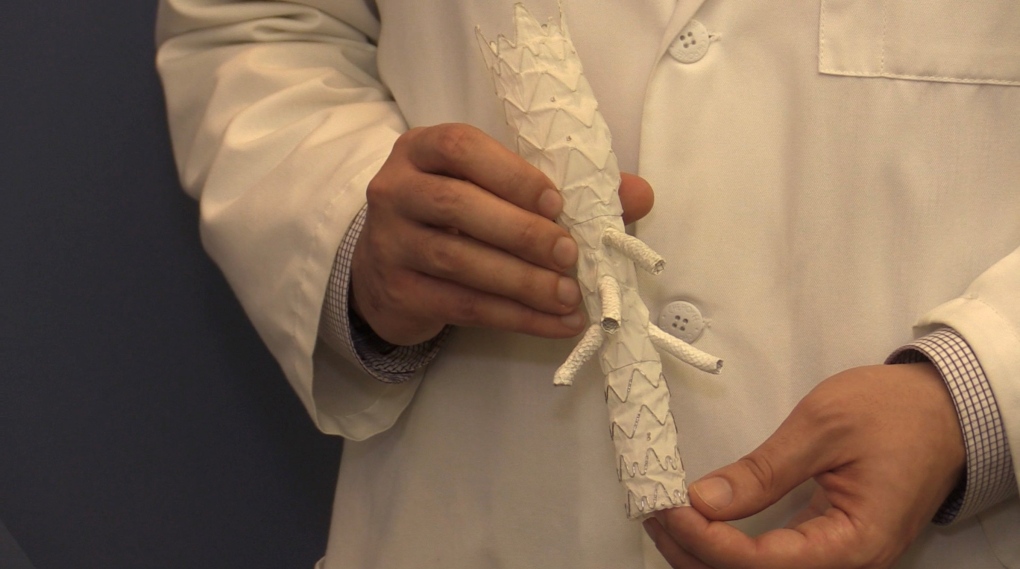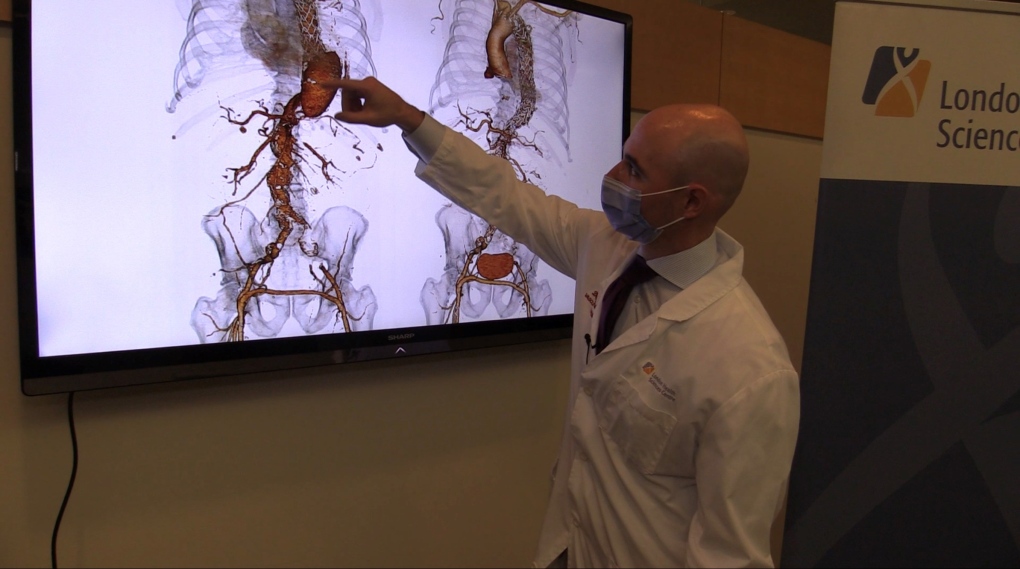LHSC performs lifesaving aortic surgery never before done in North America
As an inventor, Jeff Pitman knew he was the perfect person to try out a surgery never before performed in North America.
“I wasn't exactly in a position to say new products don't work,” laughed Pitman in an interview from London Health Sciences Centre (LHSC), Victoria Campus in London, Ont.
“I was the perfect guy to say, ‘let's try it,’” he added.
Pitman — who invented truck ladders — had an aortic dissection a couple of years ago, but some of the lesions didn’t heal properly.
“This one just got to a point where it started to block off my kidney function and both my blood flow to both my legs,” said Pitman. “I was no longer able to make my legs function. So it kind of gave me an idea that there was something drastically wrong.”
He spoke to his doctors at LHSC and they discovered a very complicated problem.
 Dr. John Landau shows off the Artivion E-nside aortic stent-graft which was used to save the life of patient Jeff Pitman in London, Ont. The surgery was the first of its kind in North America. (Source: Brent Lale/CTV London)“He developed another very large aneurysm and it was complicated by the anatomy,” said Dr. Luc Dubois, a vascular surgeon at LHSC. “He had very narrow area we had to work through, which is why we had to get access to this special device from Europe.”
Dr. John Landau shows off the Artivion E-nside aortic stent-graft which was used to save the life of patient Jeff Pitman in London, Ont. The surgery was the first of its kind in North America. (Source: Brent Lale/CTV London)“He developed another very large aneurysm and it was complicated by the anatomy,” said Dr. Luc Dubois, a vascular surgeon at LHSC. “He had very narrow area we had to work through, which is why we had to get access to this special device from Europe.”
The device is called the Artivion E-nside aortic stent-graft.
“It's sort of a fabric covered metal stent that realigns the inside of the aorta,” said Dr. John Landau, a vascular surgeon at LHSC. “We can put it inside of the aneurysm…the dissection that Jeff had to prevent blood flow from going into that dissection and aneurysm and sort of depressurize it.”
Landau describes the device as different than other stents where it is large at both ends, and small in the middle with branch stents.
“That was sort of the perfect size and shape and really the only possible device that we could use to fix Jeff's problem,” he said.
As experts in their field, and working at a large academic hospital, they were aware of the technology. They reached out to the company who indicated the device was exactly what they needed.
 Dr. Luc Dubois, a vascular surgeon at LHSC in London, Ont. shows the aortic dissection and aneurysm of patient Jeff Pitman. Pitman received a life saving surgery using never before done in North America. (Brent Lale/CTV News London)
They then sought approval from Health Canada for the emergency situation, who responded quickly knowing a rupture of the aorta could happen at any time.
Dr. Luc Dubois, a vascular surgeon at LHSC in London, Ont. shows the aortic dissection and aneurysm of patient Jeff Pitman. Pitman received a life saving surgery using never before done in North America. (Brent Lale/CTV News London)
They then sought approval from Health Canada for the emergency situation, who responded quickly knowing a rupture of the aorta could happen at any time.
“It was very simple and straightforward,” said Pitman, who had a recovery time of just a few weeks.
He added, “Simple from my end, as all I had to deal with lie there and present a good canvas. But they did the hard work because we explained it like building a ship in a bottle. They had to come in through the through the artery with wires guided by X-ray. It's a very cool technology.”
Both surgeons agree that this won’t be commonplace, but if there is another person who has the same problem as Pitman, they would be confident in using the technology again.
“The benefit of working in an academic institution affiliated with the university is this is something we'll share with other vascular surgeons in Canada to tell everyone how the experience went,” said Landau. “Hopefully it will allow other people to know that this is something that's out there that they can use if they come across a similarly challenging problem in their own institution."
CTVNews.ca Top Stories

Quebec nurse had to clean up after husband's death in Montreal hospital
On a night she should have been mourning, a nurse from Quebec's Laurentians region says she was forced to clean up her husband after he died at a hospital in Montreal.
Northern Ont. lawyer who abandoned clients in child protection cases disbarred
A North Bay, Ont., lawyer who abandoned 15 clients – many of them child protection cases – has lost his licence to practise law.
Bank of Canada officials split on when to start cutting interest rates
Members of the Bank of Canada's governing council were split on how long the central bank should wait before it starts cutting interest rates when they met earlier this month.
Maple Leafs fall to Bruins in Game 3, trail series 2-1
Brad Marchand scored twice, including the winner in the third period, and added an assist as the Boston Bruins downed the Toronto Maple Leafs 4-2 to take a 2-1 lead in their first-round playoff series Wednesday
Cuban government apologizes to Montreal-area family after delivering wrong body
Cuba's foreign affairs minister has apologized to a Montreal-area family after they were sent the wrong body following the death of a loved one.
'It was instant karma': Viral video captures failed theft attempt in Nanaimo, B.C.
Mounties in Nanaimo, B.C., say two late-night revellers are lucky their allegedly drunken antics weren't reported to police after security cameras captured the men trying to steal a heavy sign from a downtown business.
What is changing about Canada's capital gains tax and how does it impact me?
The federal government's proposed change to capital gains taxation is expected to increase taxes on investments and mainly affect wealthy Canadians and businesses. Here's what you need to know about the move.
New Indigenous loan guarantee program a 'really big deal,' Freeland says at Toronto conference
Canada's Deputy Prime Minister Chrystia Freeland was among the 1,700 delegates attending the two-day First Nations Major Projects Coalition (FNMPC) conference that concluded Tuesday in Toronto.
'Life was not fair to him': Daughter of N.B. man exonerated of murder remembers him as a kind soul
The daughter of a New Brunswick man recently exonerated from murder, is remembering her father as somebody who, despite a wrongful conviction, never became bitter or angry.
































